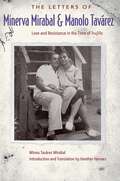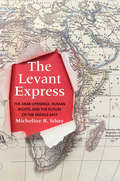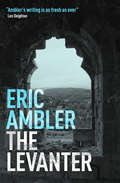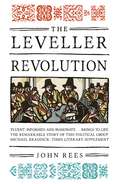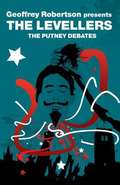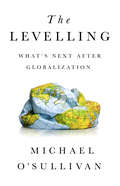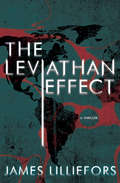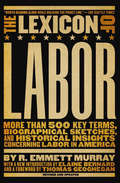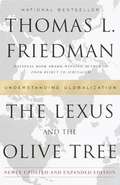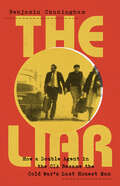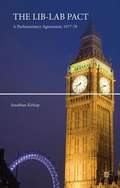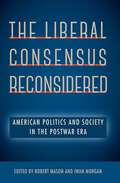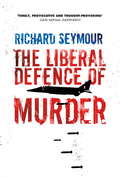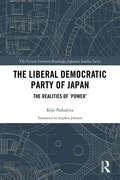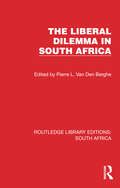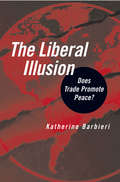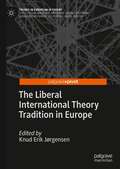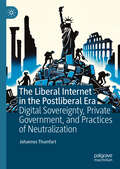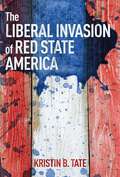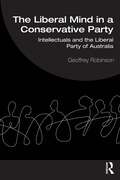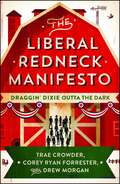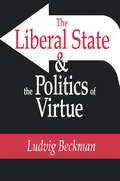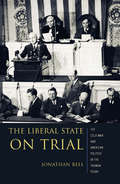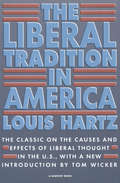- Table View
- List View
The Letters of Minerva Mirabal and Manolo Tavárez: Love and Resistance in the Time of Trujillo
by Minou Tavárez MirabalFor the first time in English, the stories of two Dominican national icons in their own words The letters between Dominican revolutionaries Minerva Mirabal Reyes and Manolo Tavárez Justo tell an intimate story of life and love under the brutal dictatorship of Rafael Trujillo, who held power in the nation from 1930 to 1961. Leaders in the 14 of June Movement, Minerva and Manolo were imprisoned multiple times. Minerva—one of three Mirabal sisters known by the code name “Las Mariposas” (The Butterflies)—was assassinated with her sisters in 1960; Manolo was killed in 1963. This translation and critical edition of their correspondence brings their stories to the English-language readers of the world. Paired with commentary from the couple’s daughter, political activist Minou Tavárez Mirabal, these 117 letters and telegrams span from the first notes Minerva and Manolo exchanged while courting in law school to the last message Manolo sent to 7-year-old Minou before his murder. Translator Heather Hennes introduces the collection with a history of the Trujillo regime and its opposition, and the book includes a foreword by Michelle Bachelet, United Nations High Commissioner for Human Rights. Through this volume, readers will discover the human complexities of the iconic and much-mythologized “Butterfly” Minerva and will appreciate the importance of the couple’s legacy in the politics and democratic growth of the country today.Publication of this work made possible by a Sustaining the Humanities through the American Rescue Plan grant from the National Endowment for the Humanities.
The Levant Express: The Arab Uprisings, Human Rights, and the Future of the Middle East
by Micheline R. IshayA surprisingly hopeful assessment of the prospects for human rights in the Middle East, and a blueprint for advancing them The enormous sense of optimism unleashed by the Arab Spring in 2011 soon gave way to widespread suffering and despair. Of the many popular uprisings against autocratic regimes, Tunisia’s now stands alone as a beacon of hope for sustainable human rights progress. Libya is a failed state; Egypt returned to military dictatorship; the Gulf States suppressed popular protests and tightened control; and Syria and Yemen are ravaged by civil war. Challenging the widely shared pessimism among regional experts, Micheline Ishay charts bold and realistic pathways for human rights in a region beset by political repression, economic distress, sectarian conflict, a refugee crisis, and violence against women. With due attention to how patterns of revolution and counterrevolution play out in different societies and historical contexts, Ishay reveals the progressive potential of subterranean human rights forces and offers strategies for transforming current realities in the Middle East.
The Levanter
by Eric AmblerA Syrian businessman is drawn into the deadly machinations of Palestinian terrorists in the acclaimed author’s Gold Dagger–winning thriller.Syria, 1970. As a self-described “Levantine mongrel,” Michael Howell is used to navigating the shifting sands of Middle East politics. Over the years, he has successfully maintained his business enterprise through war, revolutions, and takeovers, thanks in part to his office manager—and mistress—Teresa.Staunchly apolitical and programmed for survival, Howell enjoys the sweet life. But that all changes one fateful night in Damascus, when he finds men working overtime in his factory—secretly making bombs for the fanatical Palestinian Action Force. Suddenly, Howell is caught in the middle with nowhere to run.
The Leveller Revolution: Radical Political Organisation in England, 1640-1650
by John ReesThe gripping story of the Levellers, the radical movement at the heart of the English RevolutionThe Levellers, formed out of the explosive tumult of the 1640s and the battlefields of the Civil War, are central figures in the history of democracy. In this thrilling narrative, John Rees brings to life the men--including John Lilburne, Richard Overton and Thomas Rainsborough--and women who ensured victory and became an inspiration to republicans of many nations.From the raucous streets of London and the clattering printers' workshops that stoked the uprising, to the rank and file of the New Model Army and the furious Putney debates where the Levellers argued with Oliver Cromwell for the future of English democracy, this story reasserts the revolutionary nature of the 1642-51 wars and the role of ordinary people in this pivotal moment in history.In particular Rees places the Levellers at the centre of the debates of 1647 when the nation was gripped by the question of what to do with the defeated Charles I. Without the Levellers and Agitators' fortitude and well-organised opposition history may have avoided the regicide and missed its revolutionary moment. The legacy of the Levellers can be seen in the modern struggles for freedom and democracy across the world.
The Levellers: The Putney Debates
by Philip Baker Geoffrey RobertsonEvolving from Oliver Cromwell's New Model army in Parliament's struggle against King Charles I, the Levellers pushed for the removal of corruption in parliament, universal voting rights and religious toleration. This came to a head with the famous debates between the Levellers and Cromwell at St Mary's church in Putney, London. Renowned human-rights lawyer and author Geoffrey Robertson argues for the relevance of the Levellers' stand today, showing how they were the first Western radical democrats.
The Levelling: What's Next After Globalization
by Michael O'SullivanA brilliant analysis of the transition in world economics, finance, and power as the era of globalization ends and gives way to new power centers and institutions. The world is at a turning point similar to the fall of communism. Then, many focused on the collapse itself, and failed to see that a bigger trend, globalization, was about to take hold. The benefits of globalization--through the freer flow of money, people, ideas, and trade--have been many. But rather than a world that is flat, what has emerged is one of jagged peaks and rough, deep valleys characterized by wealth inequality, indebtedness, political recession, and imbalances across the world's economies. These peaks and valleys are undergoing what Michael O'Sullivan calls "the levelling"--a major transition in world economics, finance, and power. What's next is a levelling-out of wealth between poor and rich countries, of power between nations and regions, of political accountability from elites to the people, and of institutional power away from central banks and defunct twentieth-century institutions such as the WTO and the IMF.O'Sullivan then moves to ways we can develop new, pragmatic solutions to such critical problems as political discontent, stunted economic growth, the productive functioning of finance, and political-economic structures that serve broader needs.The Levelling comes at a crucial time in the rise and fall of nations. It has special importance for the US as its place in the world undergoes radical change--the ebbing of influence, profound questions over its economic model, societal decay, and the turmoil of public life.
The Leviathan Effect: A Thriller (A\mallory Brothers Thriller Ser.)
by James LillieforsHomeland Security Secretary Catherine Blaine receives a frightening communication from a hacker identified only by the pseudonym "Janus": three recent natural disasters around the world were correctly predicted--in fact, they were manufactured, not natural at all. And, says the email, unless she does exactly as Janus instructs, more disasters are coming--and they will destroy the United States. Unaware of the crisis in Washington, investigative journalist Jon Mallory stumbles on a list of seven prominent scientists who have been murdered in recent months. When the person who had given him the list goes missing herself, Jon realizes he has unwittingly become part of a deadly chain of events. He contacts his brother, ex-CIA agent Charles, looking for help. Meanwhile, Catherine Blaine has also come to Charles for help to track down the hacker Janus and learn what frightening science is threatening the world.
The Lexicon of Labor: More Than 500 Key Terms, Biographical Sketches, and Historical Insights Concerning Labor in America
by R. Emmett MurrayA thoroughly updated edition of the clever, fun-to-read compilation of union language and lore. &“Worth reading aloud while walking the picket line.&” —The Seattle Times First published in 1998, The Lexicon of Labor found a large and appreciative following among readers who were grateful to have the vibrant, powerful language of the labor movement captured in a lively single volume. This long-awaited revised and updated edition includes dozens of new terms and developments that will introduce a new generation to the labor lexicon. From Frederick Douglass to César Chávez, from the Haymarket Riots in 1886 to the Change to Win federation formed in 2005, this classic labor lexicon provides concise, enlightening sketches of over five hundred key places, people, and events in American labor history. A practical resource for students and journalists, The Lexicon of Labor is as entertaining for longtime union members seeking to get reacquainted with the traditions of the movement as it is for newcomers wishing to discover the unique language and history of unionism. The Lexicon of Labor also includes explanations of major legislative acts, definitions of key legal terminology, and complete listings of all the member unions of the AFL-CIO and independent unions in the United States. It is the perfect introduction to the history of labor in America. &“A handy reference for individuals who want an introduction to U.S. labor terminology and labor history.&” —Library Journal &“Fills a longstanding void . . . by far the largest compilation of definitions of words and phrases used in the specialized vocabulary of unionists.&” —Northwest Labor Press
The Lexus and the Olive Tree: Understanding Globalization
by Thomas L. FriedmanFrom one of our most perceptive commentators and winner of the National Book Award, a comprehensive look at the new world of globalization, the international system that, more than anything else, is shaping world affairs today. As the Foreign Affairs columnist for The New York Times, Thomas L. Friedman has traveled the globe, interviewing people from all walks of contemporary life: Brazilian peasants in the Amazon rain forest, new entrepreneurs in Indonesia, Islamic students in Teheran, and the financial wizards on Wall Street and in Silicon Valley. Now Friedman has drawn on his years on the road to produce an engrossing and original look at globalization. Globalization, he argues, is not just a phenomenon and not just a passing trend. It is the international system that replaced the Cold War system; the new, well-greased, interconnected system: Globalization is the integration of capital, technology, and information across national borders, in a way that is creating a single global market and, to some degree, a global village. Simply put, one can't possibly understand the morning news or one's own investments without some grasp of the system. Just one example: During the Cold War, we reached for the hot line between the White House and the Kremlin--a symbol that we were all divided but at least the two superpowers were in charge. In the era of globalization, we reach for the Internet--a symbol that we are all connected but nobody is totally in charge. With vivid stories and a set of original terms and concepts, Friedman offers readers remarkable access to his unique understanding of this new world order, and shows us how to see this new system. He dramatizes the conflict of "the Lexus and the olive tree"--the tension between the globalization system and ancient forces of culture, geography, tradition, and community. He also details the powerful backlash that globalization produces among those who feel brutalized by it, and he spells out what we all need to do to keep the system in balance. Finding the proper balance between the Lexus and the olive tree is the great drama of he globalization era, and the ultimate theme of Friedman's challenging, provocative book--essential reading for all who care about how the world really works.
The Liar: How a Double Agent in the CIA Became the Cold War's Last Honest Man
by Benjamin CunninghamThe Cold War meets Mad Men in the form of Karel Koecher, a double agent whose shifting loyalties and over-the-top hedonism reverberated from New York to Moscow In the mid-1970s, the CIA and KGB watched Karel Koecher closely—they were both convinced he was working for the enemy. And they were both right. Traveling with his wife, Hana, Koecher posed as a Czechoslovak asylum seeker and arrived in the US as a Communist sleeper agent. After parlaying a doctorate from Columbia into a job at the CIA, Koecher proceeded to operate as a double agent at the height of the Cold War. Shunning a low profile, the Koechers embraced Manhattan&’s high life—with cocaine, swinging, and parties emblematic of the times and their penchant for risk. Hana, who was no more than a shy teenager when she arrived, grew into a sophisticated international diamond dealer who relayed messages to Karel&’s handlers. Riding a wave of euphoria, the Koechers felt unstoppable. But it was too good to last. Using newly declassified documents, interrogation tapes, and extraordinary firsthand accounts from the Koechers themselves, Cunningham reconstructs their double lives and the fading Cold War, where a strange moral fog made it hard to know what truth was being fought for, and to what end.
The Lib-Lab Pact: A Parliamentary Agreement, 1977-78
by Jonathan KirkupThe Lib-Lab Pact examines the only formal cross-party understanding at Westminster between 1945-2010. Through the use of archival sources and unique interviews with key participants, this study brings new insights into how an agreement, short of a full coalition, came about, how it was administered, and how it impacted on both political parties. Jonathan Kirkup investigates the particular turn of events in 1977 which led to a Pact between Prime Minister, James Callaghan, and Liberal Party leader, David Steel. A review of the negotiating process reveals, for the first time, that David Steel might have achieved more policy concessions, specifically on electoral reform. This volume explores the intra-party conflict which ensued in the Liberal Party, ultimately threatening the position of Steel as leader, as policy objectives were not realized. The legacy of the Pact is assessed, and how it influenced the strategy of the Liberal Party and Liberal Democrat politicians for the next thirty years.
The Liberal Consensus Reconsidered: American Politics and Society in the Postwar Era
by Robert Mason and Iwan MorganWhen first published in 1976, Godfrey Hodgson’s America in Our Time won immediate recognition as a major interpretive study of the postwar era. In The Liberal Consensus Reconsidered, leading scholars—including Hodgson himself—confront his long-standing theory that a “liberal consensus” shaped the United States after World War II. These essays offer new insights into the era and diverging opinions on one of the most influential interpretations of mid-twentieth-century U.S. history.
The Liberal Defence of Murder
by Richard SeymourA war that has killed over a million Iraqis was a 'humanitarian intervention', the US army is a force for liberation, and the main threat to world peace is posed by Islam.Those are the arguments of a host of liberal commentators, ranging from Christopher Hitchens to Kanan Makiya, Michael Ignatieff, Paul Berman, and Bernard-Henri Levy. In this critical intervention, Richard Seymour unearths the history of liberal justifications for empire, showing how savage policies of conquest--including genocide and slavery--have been retailed as charitable missions.From the Cold War to the War on Terror, Seymour argues that the colonial tropes of 'civilization' and 'progress' still shape liberal pro-war discourse, and still conceal the same bloody realities.From the Hardcover edition.
The Liberal Democratic Party of Japan: The Realities of ‘Power’ (Nissan Institute/Routledge Japanese Studies)
by Kōji NakakitaThis book provides a thorough analysis of the Liberal Democratic Party of Japan (LDP), from a variety of perspectives including its factions, party presidential elections, the distribution of posts, national elections, local organisations, the policy making process and partner organisations. Drawing on comprehensive and up-to-date data, as well as a large number of interviews, internal party documents and quantitative data, The Liberal Democratic Party of Japan explains the machinery of the Japanese government and ruling party, exploring how policies are made. In so doing, the chapters also analyse the strengths and weaknesses of today’s LDP through a comparison of Koizumi Juni’ichirō and Abe Shinzō, both having established long-lasting administrations through their strong leadership. Demonstrating how the LDP has changed significantly over recent years, particularly since the political reforms of 1994, this book will be extremely useful to students and scholars of Japanese and Asian politics.
The Liberal Dilemma in South Africa (Routledge Library Editions: South Africa #19)
by P. L. van den BergheOriginally published in 1979, The Liberal Dilemma in South Africa discusses the dilemma of how to overthrow an oppressive social order maintained through violence in a non-violent manner. The contributors to this volume were all established social scientists and academics, with extensive experience of living and doing research in South Africa. They analyse various aspects of that dilemma and of the social order which creates it, particularly emphasizing the role of students, academics and other intellectuals in South African society.
The Liberal Heart of Europe: Essays in Memory of Alberto Giovannini
by Francesco Giavazzi Alberto Mingardi Francesco Lefebvre D’OvidioWas the European Union ever a liberal dream? How did the common market impact the liberalization in its member states? Has the EU fostered more or less economic freedom in the Old Continent? This book explores the intellectual and political genesis of the European Union, focusing especially on its relationship to classical liberalism. It explains how the new enthusiasm for liberalization associated with Reagan and Thatcher helped revive the European project in the 1980s, while providing some insights on the current challenges Europe is facing as a result of the financial crisis and the Covid-19 pandemic. The contributors highlight the role of liberal, pro-market ideas played in shaping the EU, the single market and the euro, and how these should be coming into play again if the European project is to be reanimated. This volume originates from a conference the Italian think tank Istituto Bruno Leoni hosted in 2019 and is dedicated to Alberto Giovannini (1955-2019). Giovannini was an influential macroeconomist and financial economist. His vast legacy of studies and ideas prompted this book in his honor, on the occasion of his untimely passing away.
The Liberal Illusion
by Katherine Barbieri"A very important and long-awaited major contribution to the debate . . . Her work cannot be ignored. " --Nils Petter Gleditsch,Journal of Peace Research "Barbieri builds on a solid foundation of work on trade and conflict and specifies the conditions under which trade reduces and increases conflict. . . . The bottom line is that this is an important book in the study of trade and conflict because of its comprehensive approach. " --Kathy L. Powers,Perspectives on Politics "Barbieri's analysis reveals the fundamental and intellectual weaknesses of the various arguments on this topic. [A] solid and timely contribution to the literature" --Choice The Liberal Illusionsheds light on an increasingly important question in international relations scholarship and the domain of policy making-whether international trade promotes peace. By examining a broad range of theories about trade's impact on interstate relations and undertaking a set of empirical analyses of the trade-conflict puzzle, Katherine Barbieri provides a comprehensive assessment of the liberal view that trade promotes peace. Barbieri's stunning conclusions depart from conventional wisdom in international relations. Consequently,The Liberal Illusionserves as an important counterargument and a warning call to policymakers who rely upon trade-based strategies to promote peace, strategies that appear to offer little hope of achieving their goals.
The Liberal International Theory Tradition in Europe (Trends in European IR Theory)
by Knud Erik JørgensenThis book examines how the liberal international theory tradition evolved in Europe. It includes nine chapters focusing on both historical and contemporary branches of liberal IR theorizing. The combined portrait of the prominent IR theory orientation shows a long and rich theoretical tradition but also a tradition that the scholarly community rarely fully recognize. It is currently somewhat challenged and therefore in need of further advances. Concerning the historical branches, the authors present a truly European tradition that thus was not only present in a few countries. The contributors introduce examples of liberal theorizing that IR scholars tend to dismiss and they trace the boundaries between the liberal and other theoretical traditions. Given the prominence of the tradition, the book is surprisingly among the first to present a transnational perspective on the development of the liberal international theory tradition in Europe.
The Liberal Internet in the Postliberal Era: Digital Sovereignty, Private Government, and Practices of Neutralization
by Johannes ThumfartThis book begins with an examination of the internet as a central institution of the post-Cold War liberal order. From this starting point, Johannes Thumfart analyzes the contemporary rise of digital sovereignty in Asia and Europe, alongside the establishment of private government within digital networks. He interprets these phenomena as indications of an emerging postliberal era. Thumfart engages with a wide array of empirical research and assesses liberal ideals such as state and net neutrality by discussing thinkers like Hegel, Schmitt, Mouffe, Taylor, Sandel, Fukuyama, Anderson, and Jasanoff, as well as network and rational choice theories. He contends that the internet's reification of liberal values has, paradoxically, subverted these values and catalyzed the transition to postliberalism. Thumfart suggests that instead of adhering to the traditional liberal focus on neutrality, states should adopt a more flexible approach of neutralization to respond to the complexities of this digital and postliberal era.
The Liberal Invasion of Red State America
by Kristin B. TateAll across America, conservative towns are changing. Progressive, upper-middle class urbanites are deserting expensive liberal meccas like New York and San Francisco and flocking to traditionally "red" states like Colorado, New Hampshire, Virginia, and Texas. The result is a sudden, confusing purpling of small town America. School boards and local governments are being reorganized around the progressive agendas of pushy transplants. Neighborhoods are becoming unrecognizable. And the implications for future Congressional and presidential elections are staggering. Libertarian journalist and rising media star Kristin Tate traces the great progressive flight from blue cities to red towns, using demographic statistics and alarming on-the-ground anecdotes to present a stunning picture of a nation undergoing a significant transition.
The Liberal Mind in a Conservative Party: Intellectuals and the Liberal Party of Australia
by Geoffrey RobinsonRobinson analyses the peculiarly Australian intellectual tradition of liberal conservatism within the mainstream centre-right Liberal Party of Australia. Conservative intellectuals in Australia have forged a pragmatic, sceptical and utilitarian liberal conservatism focused on the tasks of government. It remains distant both from the romantic and organicist ideas of the populist right and the simplicities of libertarianism.Focusing on key figures within this tradition, Robinson tracks the progress of Australian liberal conservatism over the years through its origins in the work of David Hume to the thoughts of Peter Coleman, David Kemp and Andrew Norton before moving forward to George Brandis and Gregory Melleuish. The Liberal Party of Australia has appealed successfully to the conservative sentiments of voters in a liberal society. The Liberal Mind in a Conservative Party tells the story of seven intellectuals who helped make this possible. Peter Coleman drew on John Anderson, Georges Sorel and Michael Oakeshott to champion neoconservatism. He argues that this potent political ideology has shaped a distinct political identity, which rejects conservative traditionalism, and libertarian economics, while defending a pragmatic approach to capitalism.A fascinating read for students and scholars of Australian politics, this book will also be of great value to readers with an interest in international centre-right politics.
The Liberal Redneck Manifesto: Draggin' Dixie Outta the Dark
by Trae Crowder Drew Morgan Corey Ryan ForresterThe Liberal Rednecks--a three-man stand-up comedy group doing scathing political satire--celebrate all that's good about the South while leading the Redneck Revolution and standing proudly blue in a sea of red.Smart, hilarious, and incisive, the Liberal Rednecks confront outdated traditions and intolerant attitudes, tackling everything people think they know about the South--the good, the bad, the glorious, and the shameful--in a laugh-out-loud funny and lively manifesto for the rise of a New South. Home to some of the best music, athletes, soldiers, whiskey, waffles, and weather the country has to offer, the South has also been bathing in backward bathroom bills and other bigoted legislation that Trae Crowder has targeted in his Liberal Redneck videos, which have gone viral with over 50 million views. Perfect for fans of Stuff White People Like and I Am America (And So Can You), The Liberal Redneck Manifesto skewers political and religious hypocrisies in witty stories and hilarious graphics--such as the Ten Commandments of the New South--and much more! While celebrating the South as one of the richest sources of American culture, this entertaining book issues a wake-up call and a reminder that the South's problems and dreams aren't that far off from the rest of America's.
The Liberal State and the Politics of Virtue
by Ludvig BeckmanAt the start of the new millennium there has been a growing awareness that traditional political institutions and ideologies do not correspond to the demands and aspirations held by many individuals and groups. Ideals and interests previously without much impact on the political debate have gained access to the public arena. These new claims include demands for recognition of homosexuals and their rights, affirmation of the particularities of indigenous peoples, sensitivity to the cultures and languages of immigrants, respect for children and their needs, solidarity with people of the developing countries and their fight for independence, care for nature, animals, attention to the social status of women, and so on. As a consequence, many governments now regulate and support many different conceptions of the good life and its virtues.In this volume, schematically divided into two parts, Ludvig Beckman challenges the common view that support for the good life, the politics of virtue, is in conflict with liberal principles. In clear, analytical language he addresses the question of what a state should do. Chapter 1 attempts to specify the meaning of "liberalism"; chapter 2 discusses the meaning of tolerance and makes more specific the notion of "virtue"; chapters 3 and 4 assess ethical and political liberalism as exemplified by the writings of Ronald Dworkin and John Rawls. In part two, chapter 5 discusses the clash between norms of justice and conceptions of virtue in the family; chapter 6 explores the meaning of the idea of an ethically neutral state; chapter 7 explores three different arguments for the neutral state as found in the work of Ronald Dworkin; chapter 8 presents an analysis of the idea of the neutral state with the theory of John Rawls put under scrutiny; chapter 9 explains why the attempt to justify the neutral state by referring to modified skepticism fails and proposes a distinction between being skeptical and being critical.Participating in the current debate on communitarianism, The Liberal State and the Politics of Virtue will be particularly interesting to people engaged in the public debate on ethics, morality and the state. It will also be of interest to teachers and researchers in the fields of politics and philosophy.
The Liberal State on Trial: The Cold War and American Politics in the Truman Years (Columbia Studies in Contemporary American History)
by Jonathan BellWhat was left, in both senses of the word, of liberalism after the death of Franklin Roosevelt? This question has aroused considerable historical debate because it raises the question of why the United States, during the Truman years, developed a much less state-centered orthodoxy than other comparable, powerful liberal states. What were the consequences of this fundamental choice that would shape the character and direction of American society during the second half of the twentieth century? This book explores the role of the Cold War in shifting the center of gravity in American politics sharply to the right in the years immediately following World War II. Jonathan Bell demonstrates that there was far more active and vibrant debate about the potential for liberal ideas before they become submerged in Cold War anti-state rhetoric than has generally been recognized. Using case studies from Senate and House races from 1946 to 1952, Bell shows how the anti-statist imagery that defined the Cold War in political debate became the key weapon among right-wing and business interest groups and their political representatives with which to discredit political figures who wanted to expand political liberalism beyond existing New Deal measures. He depicts how this process implicitly endorsed socioeconomic inequality.
The Liberal Tradition in America: The Classic on the Causes and Effects of Liberal Thought in the U.S.
by Louis HartzThis &“brilliantly written&” look at the original meaning of the liberal philosophy has become a classic of political science (American Historical Review). Winner of the Woodrow Wilson Foundation Award As the word &“liberal&” has been misused and its meaning diluted in recent decades, this study of American political thought since the Revolution is a valuable look at the &“liberal tradition&” that has been central to US history. Louis Hartz, who taught government at Harvard, shows how individual liberty, equality, and capitalism have been the values at the root of liberalism—and offers enlightening historical context that reminds us of America&’s unique place and important role in the world. &“Lively and thought-provoking . . . Fascinating reading.&” —The Review of Politics Includes an introduction by Tom Wicker
